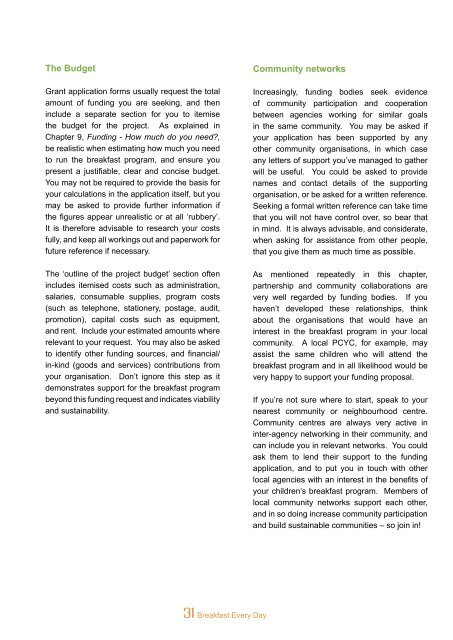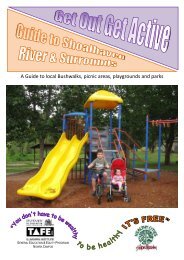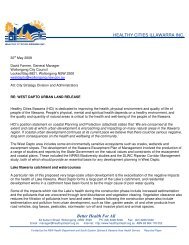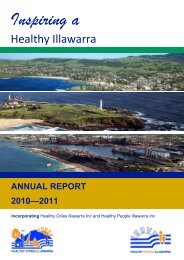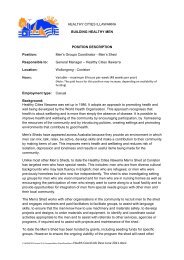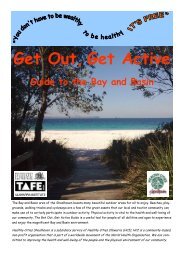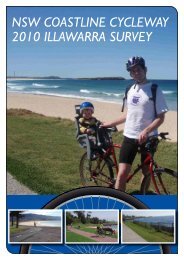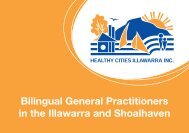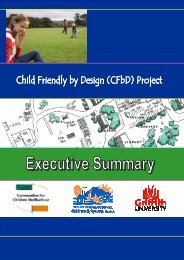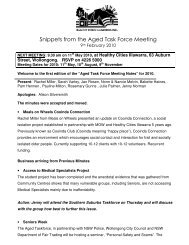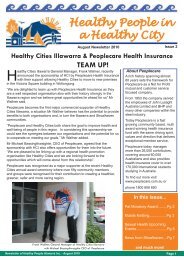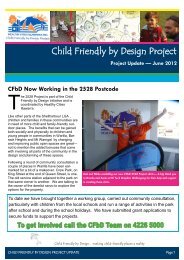here - Healthy Cities Illawarra
here - Healthy Cities Illawarra
here - Healthy Cities Illawarra
You also want an ePaper? Increase the reach of your titles
YUMPU automatically turns print PDFs into web optimized ePapers that Google loves.
The Budget<br />
Grant application forms usually request the total<br />
amount of funding you are seeking, and then<br />
include a separate section for you to itemise<br />
the budget for the project. As explained in<br />
Chapter 9, Funding - How much do you need?,<br />
be realistic when estimating how much you need<br />
to run the breakfast program, and ensure you<br />
present a justifiable, clear and concise budget.<br />
You may not be required to provide the basis for<br />
your calculations in the application itself, but you<br />
may be asked to provide further information if<br />
the figures appear unrealistic or at all ‘rubbery’.<br />
It is t<strong>here</strong>fore advisable to research your costs<br />
fully, and keep all workings out and paperwork for<br />
future reference if necessary.<br />
The ‘outline of the project budget’ section often<br />
includes itemised costs such as administration,<br />
salaries, consumable supplies, program costs<br />
(such as telephone, stationery, postage, audit,<br />
promotion), capital costs such as equipment,<br />
and rent. Include your estimated amounts w<strong>here</strong><br />
relevant to your request. You may also be asked<br />
to identify other funding sources, and financial/<br />
in-kind (goods and services) contributions from<br />
your organisation. Don’t ignore this step as it<br />
demonstrates support for the breakfast program<br />
beyond this funding request and indicates viability<br />
and sustainability.<br />
Community networks<br />
Increasingly, funding bodies seek evidence<br />
of community participation and cooperation<br />
between agencies working for similar goals<br />
in the same community. You may be asked if<br />
your application has been supported by any<br />
other community organisations, in which case<br />
any letters of support you’ve managed to gather<br />
will be useful. You could be asked to provide<br />
names and contact details of the supporting<br />
organisation, or be asked for a written reference.<br />
Seeking a formal written reference can take time<br />
that you will not have control over, so bear that<br />
in mind. It is always advisable, and considerate,<br />
when asking for assistance from other people,<br />
that you give them as much time as possible.<br />
As mentioned repeatedly in this chapter,<br />
partnership and community collaborations are<br />
very well regarded by funding bodies. If you<br />
haven’t developed these relationships, think<br />
about the organisations that would have an<br />
interest in the breakfast program in your local<br />
community. A local PCYC, for example, may<br />
assist the same children who will attend the<br />
breakfast program and in all likelihood would be<br />
very happy to support your funding proposal.<br />
If you’re not sure w<strong>here</strong> to start, speak to your<br />
nearest community or neighbourhood centre.<br />
Community centres are always very active in<br />
inter-agency networking in their community, and<br />
can include you in relevant networks. You could<br />
ask them to lend their support to the funding<br />
application, and to put you in touch with other<br />
local agencies with an interest in the benefits of<br />
your children’s breakfast program. Members of<br />
local community networks support each other,<br />
and in so doing increase community participation<br />
and build sustainable communities – so join in!<br />
31 Breakfast Every Day


